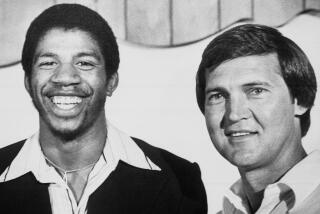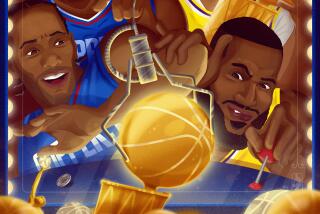A Trying Time
- Share via
Sometimes he dreamed that he wasn’t he.
As a basketball demigod, Michael Jordan’s problem was a very human one. He couldn’t tell what it meant to him, if the joy still outweighed the hassle, unless he stepped out of it, at which point he would find it meant everything.
So he left in 1993 ... and returned in ’95 ... and left in ’98 ... and returned in 2001. Now, as he makes the first of this season’s two local appearances tonight against the Clippers, he’s on his way out again, this time never to return (he says).
Not that this one will be as tidy as ‘98, quitting on a last-second, title-winning 20-footer, his right hand frozen in its follow-through as if waving bye-bye, before he ruined it by coming back, taking the gift wrapping off the package.
Of course, that was only his image, which was the Frankenstein monster he created. In the end, Jordan wasn’t really about winning, which is transitory and so often beyond one’s control, but about something more important, trying.
“I would like to be remembered ... as a guy who truly loved the game and loved to take challenges and always [went] against the odds,” he said last weekend in Atlanta.
“People said he couldn’t do anything and he said he could. Or he just believed in the unknown, [so] that no matter what, he chased it.
“I’m not saying everything good happened to him. Some bad things happened, but he always was able to rise above the bad things. I just want to be remembered in that way as a competitor, that never gave up on anything.”
Bad things have happened often enough in his two-season comeback with the Washington Wizards. In the minds of many, it is intertwined with the civil suit filed against him by a former lover, although the suit, based on events in the ‘90s, had nothing to do with the comeback.
On the floor, which was the public’s only legitimate concern, he had some bad nights and missed some dunks (including one in each of his last two All-Star appearances with -- blush -- lots of people watching). However, if his mid-Air days are behind him, he trimmed down, speeded up, worked out his knee problems and now is playing so well (averaging 18.8 points, 5.4 rebounds and 3.9 assists in 35.4 minutes), people ask if he’ll stay another season.
But then, who needed a merely human Jordan?
Jordan’s image cut both ways. It flowed from the warm, skillfully crafted commercials and the business deals that meant so much to him (he once referred to Nike as a surrogate father), representing the recognition he sought, not to mention the ever-popular free money.
Of course, after a while, he didn’t need more recognition and people were disappointed to learn he wasn’t still the boy next door who worried girls didn’t like him because of his big ears and took home economics classes so he could look out for himself if he never found anyone.
Honed for competition, he couldn’t quit competing, be it professionally or socially. This is a common problem for professional athletes, and the more dominating they are, the worse they have it. Jordan, of course, is the most dominant of them all.
Critics said he came back, at 37, to a bad team, because “it’s always about him,” and he needed the spotlight. Actually, the thing he liked about playing was playing. The 1,000 daily intrusions on his privacy, he hated.
The Wizards, per his instructions, buttoned up the organization around him, like a safe. Even in Atlanta, after an All-Star weekend dedicated to him, he showed up in the interview room and announced: “Let’s go, five minutes.”
For all the debate, a comeback presented no peril to Jordan, with his iron-willed refusal to let his public run his life. He could dare and fail and anyone who didn’t like it could change the channel.
Nevertheless, being Jordan, he surely imagined squeezing into the playoffs and then pulling the Wizards through as he did with Chicago, game by game, big shot by big shot.
The reality was, his Bulls were a lot better than his Wizards and what he longed for most -- to play for another title -- he couldn’t have.
In the absence of that, even playing as well as he is, what’s the point?
“I just think this is my time,” he said in Atlanta, sounding wistful but convinced. “This is the perfect time for me. This is my choice. The itch is finally scratched....
“My gut basically has said this is it and I’m going to go with that.”
So, if he lost his innocence (as he noted wryly when asked about going into politics, “We all have some damage in our closets”), if he went from boy next door to guarded icon, his legacy is safe.
He truly loved the game, he believed in the unknown and, no matter what, no matter how great the odds, he’s still chasing it.
More to Read
Go beyond the scoreboard
Get the latest on L.A.'s teams in the daily Sports Report newsletter.
You may occasionally receive promotional content from the Los Angeles Times.






